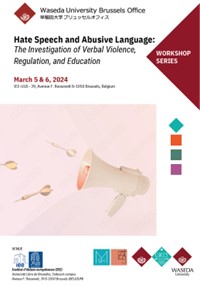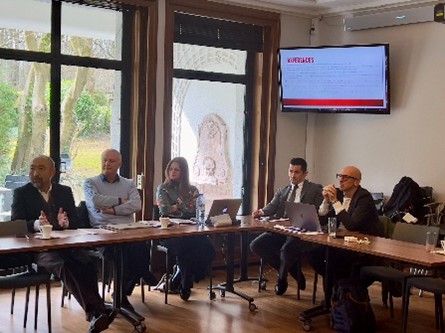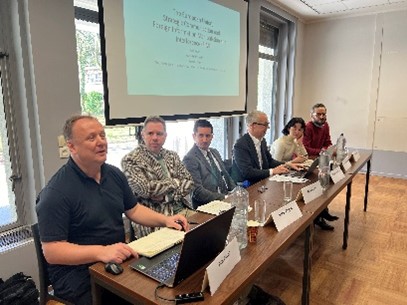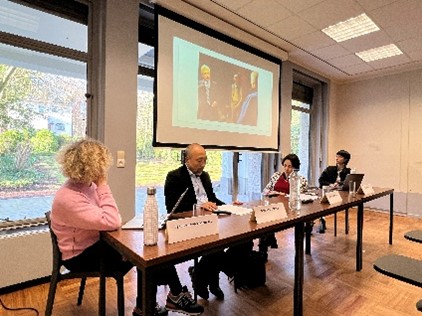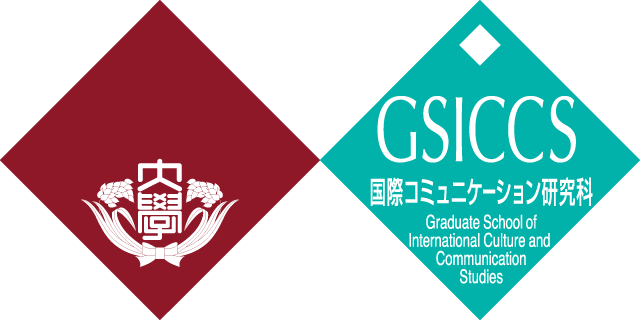- News
- [Report] Professor Detey, Professor Morita and Professor Bacon co-organized an international and interdisciplinary workshop around “Hate Speech and Abusive Language” at the Waseda Brussels Office as part of the EU-Japan Forum 2024
[Report] Professor Detey, Professor Morita and Professor Bacon co-organized an international and interdisciplinary workshop around “Hate Speech and Abusive Language” at the Waseda Brussels Office as part of the EU-Japan Forum 2024
![[Report] Professor Detey, Professor Morita and Professor Bacon co-organized an international and interdisciplinary workshop around “Hate Speech and Abusive Language” at the Waseda Brussels Office as part of the EU-Japan Forum 2024](https://www.waseda.jp/fire/gsiccs/assets/uploads/2024/04/ff872935b041ccfe9ef07d433754aae1.jpg)
- Posted
- Thu, 11 Apr 2024
Organized at the IEE-ULB by the Waseda Brussels Office, this interdisciplinary workshop (5-6/03/2024) brought together dozens of scholars from both Europe and Japan working on “Hate Speech” and “Abusive Language”. Entitled “Hate Speech and Abusive Language: The Investigation of Verbal Violence, Regulation, and Education“, the workshop was co-organized by the School of International Studies (SILS) and the Graduate School of International Culture and Communication Studies (GSICCS) at Waseda, and the Institut d’études européennes (IEE) of the Université libre de Bruxelles (ULB), with Professor Sylvain Detey (Waseda University – SILS) serving as its’ main academic chair, alongside professor paul Bacon (Waseda – GSICCS & GSAPS) and Norimasa Morita (Waseda – GSICCS & SILS). Supported financially by Waseda and the Institut d’études européennes, the workshop aimed, through a multiplicity of angles, to shed some light on the complexity of contemporary “verbal violence” and to offer some suggestions as to how to look for a solution to the problems it creates. It welcomed two dozen European and Japanese researchers from 5 disciplinary panels. Each of these panels unpacked current trends surrounding “Hate Speech and Abusive Language” from a specific disciplinary perspective, including: (i) linguistic and education studies, (ii) political science, (iii) sociology, (iv) film studies, (v) media studies and international relations. A detailed program with the names of all participants and paper titles can be found here: https://www.iee-ulb.eu/content/uploads/2024/02/WBO-Workshop-2024-Hate-Speech-FINAL.pdf
Thanks to the Waseda Brussels Office, established in April 2016 with the aim of raising Waseda University’s profile in Europe and promote international research collaboration, this workshop was successful in several ways. First, it allowed many participants to meet for the first time and expand their scholarly network around common research themes (under the umbrella term of “Hate Speech” and “Abusive Language”) and across disciplinary boundaries, especially between Waseda researchers and researchers at European institutions (ULB in Belgium, of course, but also, Polytechnique in France, Sienna in Italy, Southampton in the UK). Second, through the presentations, but also during the Q&A sessions as well as during the informal discussions held during the breaks, all participants were able to update their understanding and knowledge of contemporary issues across the world in a multidisciplinary perspective (e.g. South America, UK, China, France, Italy, Belgium, EU, Japan). Third, with participants and attendees including all categories of researchers (including graduate students), it fostered an open and rich dialogue across fields and generations. Finally, the workshop, which was part of the EU-Japan Forum 2024, enhanced the visibility of Waseda’s research activity in Europe, through promotional announcements.
This workshop could not have been organized without the dedication and efficiency of the Organizing Committee of the Waseda Brussels Office at ULB, namely Jean-Louis Moortgat and Frederik Ponjaert. Their contribution to the success of the workshop has been pivotal.
